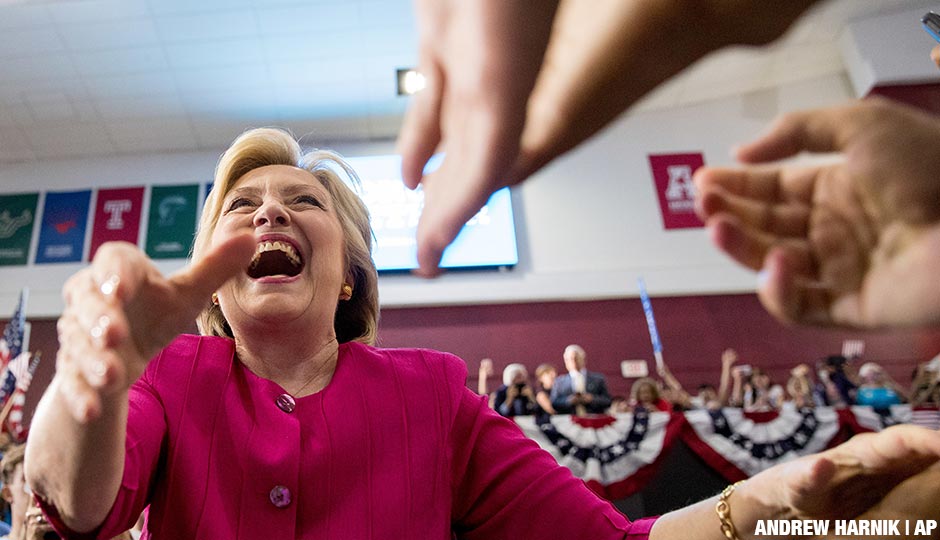I’m Not Voting for Hillary Clinton — I’m Voting for What She’ll Do

I’m not voting for Hillary Clinton.
I will technically go in and press her name in the polling booth, but what I’m really voting for is action on all the issues that matter. President Barack Obama effectively summed up this election for me when he said in a speech at the Congressional Black Caucus dinner, “Our values are on the ballot.” This cycle has given even longtime political observers whiplash, so I’m empathetic to those who want to tune it all out. But while so much campaign coverage has focused on the clash of personalities, there are real people with real hopes, needs and ideas who will be impacted by the election’s outcome. For me, this election boils down to who’s going to move us forward in key areas and who would take us backwards. Let’s cut through the noise and focus on what we’re really voting for on November 8th.
On poverty:
I’ve talked about this issue a lot because it has huge effects all across our city, but specifically in areas like North Philly. Finding solutions to poverty is the moral and economic imperative of our generation. These aren’t stats on a chart, these are real people — my family, friends, and neighbors — and they need someone in the White House focused on them.
Hillary Clinton wants to raise wages, create tax incentives and supports to tackle housing insecurity, and make the largest investment in jobs since WWII. That’s a big deal. She also understands that environmental justice, education equity and access to quality health care have to be a part of the equation to stomping out this problem.
Donald Trump hasn’t mentioned this issue once in a serious way, but what we do know isn’t good. He believes wages are too high, routinely stiffs vendors (many small businesses), and has outsourced jobs.
On criminal justice reform and civil rights:
We can’t talk about fixing our criminal justice system without addressing in tandem the implicit and explicit biases that have riddled it to date. We can’t address the fact that African-Americans and people of color are more likely to have encounters with the police, more likely to have that encounter become physical in nature, and more likely to be arrested, charged and held longer than their white counterparts without also addressing a mindset in our nation that devalues black and brown lives. No one is free until we’re all free. We can’t stay home or throw up our hands if we care about reform because these candidates have drastically different ideas on this and most other topics.
Donald Trump is an “all lives matter” guy who calls himself the “law-and-order” candidate. He has taken every opportunity to prove his bigotry, misogyny and hatefulness. He has egged on attacks against protesters at his rallies, wants to round up 11 million people, and has advocated for a national stop-and-frisk program. His top surrogate has called Black Lives Matter “racist.”
Hillary Clinton has some different ideas. She believes that Black Lives Matter, understands that private prisons are immoral, and has supported President Obama’s work to end them federally and work with states to do the same. She understands that anti-bias training in a necessity for law enforcement, mandatory minimums must be abolished, and that we must dismantle the school-to-prison pipeline.
On education:
I don’t have children yet, but when I do, I know that my priority will be their happiness, health and education. In Philadelphia, we know that reforming our education system is a priority, and that its current failures are a drag on our civic fabric, businesses and moral character. While we have unique local challenges, such as the need to dissolve the School Reform Commission, there are national deficiencies as well, particularly around cost and access from pre-K to college/trades.
Hillary Clinton understands that no one has all the answers, and throughout her career you see a leader willing to collaborate and integrate others’ ideas. Look at the college plan she put together with Senator Bernie Sanders. It would allow 83 percent of Pennsylvania students to go to a public college for free. She also has laid out new ideas on how to reduce the cost of childcare and expand access to quality pre-K. She has spent her entire life fighting for families and children, and these are fights I’m confident she’s prepared to win.
Donald Trump, on the other hand, is the founder of Trump University, which has a pending fraud case that goes to trial after the election. Other than that connection, I’m not aware of any plans he has on this topic.
On these and every other defining challenge, like climate change (which Donald thinks is a hoax), national security, immigration, the Supreme Court and women’s rights, there is a clear choice on who’s right, who’s wrong, and which candidate has plans to fix these issues. We are only days away from the most consequential election of our country’s history. What we do or don’t do matters. The third-party candidates will not be elected, both candidates are not equally bad, and yes, your vote matters: The election isn’t rigged and the results will say everything about what type of country and world we want going forward. This decision is about much more than Clinton vs. Trump or a judgement on two cults of personality. It’s about the issues, and who will carry the ball forward on them.
Malcolm Kenyatta is a local political consultant and a community leader who sits on the boards of numerous Philadelphia nonprofits. He was a delegate to the Democratic National Convention, and starred in an ad for the Clinton campaign.


